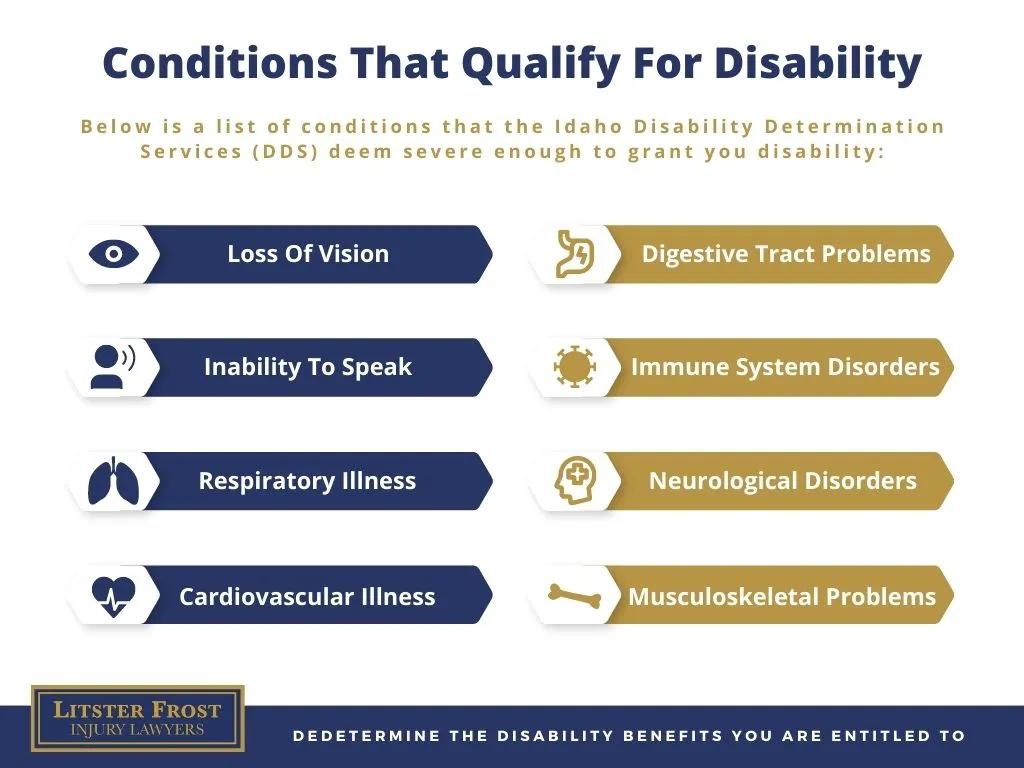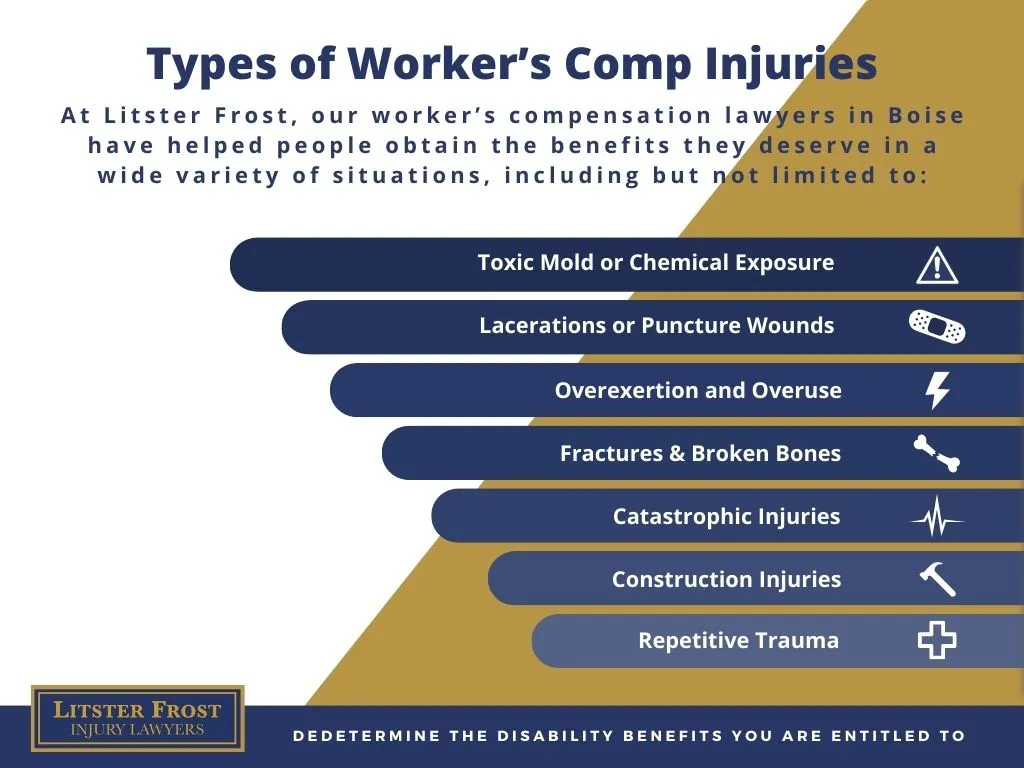Our Idaho Worker’s Compensation Attorneys Can Help You Defend Your Rights.
Act quickly to protect your family from financial hardship!
- We put the needs of our clients first.
- Every question pertaining to worker’s compensation is a valid one, and we will help you to understand the entire process.
- Our team negotiates interim payments so that you can get your bills paid while your case is ongoing.
Boise Workers Compensation Lawyers
Getting hurt on the job can be devastating. Physical injuries, medical bills, and lost wages can all feel overwhelming and complicated to navigate. While many accidents occur on construction sites or with heavy equipment, workplace injuries can occur in any setting. This includes offices, stores, government buildings, schools, hospitals, work trips, and more.
Unfortunately, dealing with the aftermath of your workplace injury can be complex. While workers comp is typically covered and paid for by private insurance companies through an employer, an insurance company has its own incentives for denying or minimizing your claim.
If you’ve been hurt on the job, it’s essential to take steps to protect your rights and get fair compensation by receiving the worker’s compensation benefits you deserve. These benefits are designed to help pay your medical bills and lost wages while recovering.
With decades of experience, the Boise worker’s compensation lawyers at Litster Frost are well-prepared to handle your case. We’ve helped clients throughout Idaho obtain their worker’s compensation benefits. We understand the important role these benefits play in our clients’ lives. That’s why we handle each case from beginning to end and fight for our clients every step of the way.
How Does Worker’s Compensation Work in Idaho?
In Idaho, employers are required by law to carry worker’s compensation insurance. Employees hurt on the job should never have to pay out of pocket for injuries sustained at work. Instead, employers are required by law to pay for worker’s compensation benefits that cover an injured employee’s medical bills and a portion of their lost income. Work injuries or illnesses can be caused by a one-time accident like a fall or repeat exposure like extremely loud working conditions.
The best way to ensure you get the benefits you deserve is to hire an expert worker’s compensation lawyer in Boise. At Litster Frost, our attorneys will help you navigate the legal system from start to finish. We will ensure you understand how worker’s comp works in Idaho and help you submit your claim to get you the fair compensation you deserve for your injuries.
Permanent Disability Benefits
If your worker’s compensation claim is denied, it’s essential to file for disability. Whether you qualify for short-term or permanent disability depends on the extent of your injuries and whether you can go back to work. The Idaho Department of Labor looks at various factors when determining if you are entitled to permanent disability benefits. These include:
- Whether you can do the work you did before you were injured.
- Whether you can adjust to other work after an injury.
- How long your disability is expected to last.
- Loss of vision
- Inability to speak
- Respiratory illness
- Cardiovascular illness
- Digestive tract problems
- Immune system disorders
- Neurological disorders
- Musculoskeletal problems
If you don’t know which category your condition falls under, the Boise worker’s compensation lawyers at Litster Frost can help you determine the disability benefits you are entitled to.

Workers’ Comp Death Benefits
Losing a spouse or loved one to a workplace accident is an overwhelming tragedy. One event, one moment, has the power to change your life forever. At Litster Frost, our attorneys understand the scope of your loss and how your world has been turned upside down. We want you to know that in this time of sorrow, we are here to protect your right. If you’ve lost a loved one to a workplace accident that claimed their life, you may be entitled to worker’s compensation death benefits. These benefits are to provide you and your family with the financial security you need to get through the future together. Our worker’s compensation lawyers in Boise will use their experience in Idaho law to obtain every benefit that you and your family are entitled to.
In Idaho, worker’s compensation death benefits must be filed within one year from the date of a fatal accident or occupational exposure that resulted in the death of your loved one. Those eligible for death benefits include a surviving spouse and their children. Death benefits include a maximum burial allowance of $6,000 and up to 50% of the current average state wage. These can be paid for up to 500 weeks, which equals approximately 9 ½ years.
If you’ve lost a loved one in a fatal work-related accident, we strongly encourage you to reach out to the experienced attorneys at Litster Frost to review your rights and legal options under the law.
Types of Worker’s Comp Injuries
There are a wide variety of ways to get injured at work in Idaho, as there are jobs. At Litster Frost, our worker’s compensation lawyers in Boise have helped people obtain the benefits they deserve in a wide variety of situations, including but not limited to:
Construction Injuries
Construction sites in Idaho are one of the most heavily regulated work environments that exist. That’s why various permits, inspections, training, and other safety programs are in place to keep people safe while working in the construction industry. Unfortunately, thousands of injuries still occur every year throughout the United States, as construction tops the list in terms of accidents and injuries on the job and the severity of those injuries.
Repetitive Trauma
Whether you work at an assembly line in a factory or type on a keyboard all day long, both involve repetitive movements over a long period of time. This can cause repetitive trauma to your body in terms of low back injuries, shoulder injuries, neck injuries, or Carpal Tunnel Syndrome.
Toxic Mold or Chemical Exposure
Toxic mold or chemical exposure can occur in any workplace. Firefighters, paramedics, first responders, factory workers, and farm workers are prone to exposure to these elements. Exposure to toxic mold or harmful chemicals can result in cancer, asthma, tuberculosis, pulmonological disorders, COPD, or other similar conditions.
Fractures & Broken Bones
Breaking a bone is a serious injury. Workplace injuries that result in fractures or broken bones are often due to heavy falling objects or tripping and falling. Whether an object falls on you or you slip and fall on a walkway, you may end up dealing with a serious work injury that requires time to heal before you are able to go back to work.

Catastrophic Injuries
Catastrophic workplace injuries include amputations, crushing injuries, severe burns, and other permanently disabling injuries. Unfortunately, these types of injuries result in a long-term recovery or permanent disability. In many of these cases, people who suffer from a catastrophic work injury may be entitled to benefits for the rest of their lives. These include, but aren’t limited to:
- Loss of limbs
- Traumatic Brain Injury(TBI)
- Electrocution
- Head trauma
- Chemical or severe burns
- Loss of sight
- Loss of hearing
Lacerations or Puncture Wounds
As one of the most common workplace injuries, lacerations or puncture wounds can range from relatively minor to extremely hazardous. Since there are a wide variety of ways to get cut or punctured on the job, this type of injury can occur in a wide variety of workplaces in various industries.
Overexertion and Overuse
If your job demands physical labor that requires you to pull, push, lift, or throw, you could end up with an overexertion or overuse workplace injury. This can result in pulled muscles or strained joints. These types of injuries are often related to those working in warehouses, construction, factories, and package delivery. Overexertion and overuse are also the most common workplace injuries. Activities associated with these injuries, include, but aren’t limited to:
- Repeated use of tools
- Repeated lifting of boxes
- Floor-to-waist or wist-to-overhead lifting
- Repeated stair climbing
- Repeated twisting and kneeling
Idaho Work Compensation Claims at a Glance
Report the Injury
The injured employee should immediately report the incident to his or her employer.
Written Record
Reporting will help to verify the accident later because a written record of injury will be made.
Medical Attention
It is also important that the employee seek medical attention as soon as possible. This lays the groundwork for the claim.
Accident Report
Next, the employer must fill out an accident report. The employer is required to complete the First Report of Injury or Illness form, as required by the Idaho Industrial Commission, and send it to the insurance company.
Insurance Process
The insurance company will speak to the attending physician to determine whether to honor the claim and how to value it. This can be time-consuming and difficult, especially since the adjuster may not understand the extent of the injuries or the seriousness of the situation.
Acquire Legal Counsel
After filing your accident report, immediately acquiring legal counsel is key. Call Litster Frost Injury Lawyers today for a free consultation!
* While these are not the only causes of birth injury, they are very common and often result in serious injury.
What if Your Claim is Denied?
Denial of workers compensation claims is not an uncommon occurrence.
When this happens, your counsel can question the insurance agency to find out where the errors were. Armed with this information, we begin building your case. During this process, we will act as the intermediary to ensure no loopholes are present that could result in denial of benefits.
Claim denials introduce a lot of paperwork.
Gathering witnesses, speaking with medical professionals, and finding a way to absorb any additional expenses are tasks that all fall on your attorney. Securing documentation to prove your innocence is the first priority. Once all documentation has been gathered, we will appeal your claim, which will then go into review.
There are two types of benefits afforded by workers compensation.
Temporary: Temporary disability is when a professional deems that the employee is injured but has the potential to fully heal and return to work.
Permanent: Someone with a permanent disability will be diagnosed by a medical professional who advises that the employee can no longer work in their previous capacity due to the accident. It is the doctor’s opinion that there is no chance of complete rehabilitation. You never want to fully trust medical professionals who were recommended to you by the insurance company of your employer.
Why do insurance companies deny claims?
From the misspelling of a name to something more technical, workers compensation claims can be tied up for a very long time.
Make sure you are putting yourself in the right position to get your claim approved. Making small mistakes can hold up your claim for months, and fighting with an employer who is trying to deny you benefits can take even longer.
What Happens After the Claims Process?
Once the claim is under review again, we work to come to an agreement with the insurance company.
Again, they are not in business to represent you—they represent the best interests of your employer. We start negotiations, making sure all variables are considered, such as pain, suffering, loss of income, loss of work, and other elements that paint the complete picture of how much devastation your injury has caused.
Each day, workers compensation claims are filed and denied.
Don’t put you or your family at risk by being negligent. Time is of the essence when filing a claim.
03
The longer you wait, the greater your chances of being denied, especially if you are seeking medical attention.
Most claim windows expire 60 days after the injury. If you do not file your claim within that time period, you will forego your chances.
We fight to get you interim payments to offset your income during this time.
Most people do not realize that having adequate legal representation is the only way to ensure a complete and thorough settlement that is fair and unbiased.
Boise Worker’s Compensation Lawyers
At Litster Frost, we have extensive knowledge of the Idaho worker’s compensation system, including rules and laws regarding eligibility for benefits, forms, types of evidence, and deadlines. Our attorneys will conduct a thorough investigation of all the facts of your care and help you prepare and file all the required documentation. We will also be your advocate at all hearings, meetings, and other proceedings.
If you’ve been injured at work in Idaho, contact us today for a free consultation. We’ll help you get the benefits and fair compensation that you deserve.



